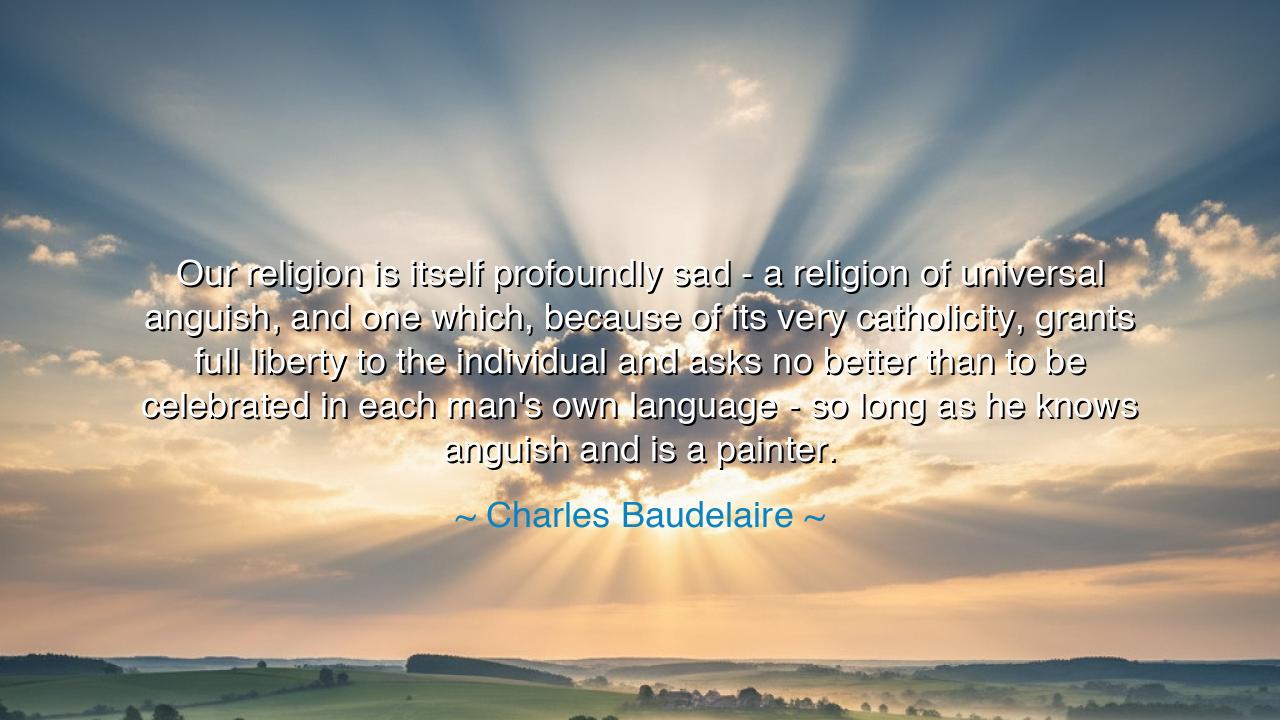
Our religion is itself profoundly sad - a religion of universal
Our religion is itself profoundly sad - a religion of universal anguish, and one which, because of its very catholicity, grants full liberty to the individual and asks no better than to be celebrated in each man's own language - so long as he knows anguish and is a painter.






Hear the words of Charles Baudelaire, poet of shadows and prophet of beauty born of suffering: “Our religion is itself profoundly sad—a religion of universal anguish, and one which, because of its very catholicity, grants full liberty to the individual and asks no better than to be celebrated in each man’s own language—so long as he knows anguish and is a painter.” In this declaration lies the essence of Baudelaire’s creed: that true art is forged in sorrow, that the deepest expression of the human spirit comes not from comfort but from pain, and that every soul who suffers has the right to transmute that suffering into creation.
The meaning of this sad religion is not a faith bound by temple walls or priestly rites, but a universal fellowship of those who have known despair and chosen to make beauty from it. Baudelaire proclaims anguish as the common language, the sacrament shared by all artists. To him, art is not amusement or ornament, but a liturgy of sorrow, where every brushstroke or word is an offering upon the altar of suffering. Yet, paradoxically, this is not a religion of bondage but of liberty, for each soul is free to express their grief in their own tongue, their own images, their own visions.
The ancients, too, knew this truth. The tragedians of Greece—Aeschylus, Sophocles, Euripides—built their theatres not to distract, but to confront sorrow openly. When Athens gathered to watch Oedipus Rex or Antigone, they were not seeking laughter, but purification through tears. This was their religion of anguish, a communal facing of pain that cleansed the soul. In this, they lived Baudelaire’s vision centuries before his birth: that through shared sadness, humanity finds both truth and freedom.
Consider the story of Vincent van Gogh, painter of tormented skies and burning fields. He lived in anguish, poor, rejected, restless, yet in his pain he poured forth visions that later generations would revere as divine. He had no church, no congregation, but his art became his religion, and his brushstrokes became his prayers. He celebrated in his own language—the language of swirling stars and trembling colors—proving Baudelaire’s creed true: that to be a painter, one need only anguish and the courage to create.
Baudelaire also speaks of catholicity, not in the narrow sense of a church, but in its ancient meaning: universality. His “sad religion” is for all—the rich and poor, the scholar and the child, the saint and the sinner—so long as they know sorrow and dare to express it. There is no single dogma, no rigid rite, only the shared truth of suffering and the freedom to make meaning of it. It is this openness that makes it beautiful, for in the temple of anguish, all are equal, and all may bring their offerings of art.
The lesson, O seeker, is clear: do not flee from your sorrow, for it is the very material of creation. If you feel anguish, do not bury it in silence, but shape it into song, painting, or story. Let your sadness become a prayer, your grief a hymn. For in giving voice to suffering, you not only heal yourself but join the eternal fellowship of all who have suffered before you, turning despair into beauty that endures.
Practical is this counsel: when anguish comes, do not curse it as enemy, but welcome it as teacher. Write your pain, paint your sorrow, sing your lament. Share it, not for applause, but for truth. And when you encounter the art of others, look not for perfection, but for the echo of anguish that makes them kin to you. In this way, you will live the religion Baudelaire describes—one that sanctifies suffering and transforms it into beauty.
Thus Baudelaire’s words stand as both prophecy and command: “Our religion is itself profoundly sad… so long as he knows anguish and is a painter.” Let us take up this creed, not as despair, but as transformation. For in embracing our anguish and making it art, we find a freedom greater than any other—the freedom to be wholly human, wholly alive, and wholly true.






AAdministratorAdministrator
Welcome, honored guests. Please leave a comment, we will respond soon